Poetry Dinner Party
On intimacy vs. trauma dumping and a poem about living in a glasshouse.
It’s mid-July, Monday the 16th, in Amsterdam, and instead of a sunny midsummer eve, we find ourselves grappling with glumness. The air feels thick and heavy with the promise of rain. Seeking solace and kinship, poets, and poetry aficionados, make their way to NDSM in Amsterdam Noord.
The setup at Treehouse is a stark contrast to the gloom and doom of the outside world; a communal table with bright pink and green decor, an altar of candy-colored candles in the center, neon scribbles on paper tablecloth, and cute outfits straight out of a feel-good rom-com.
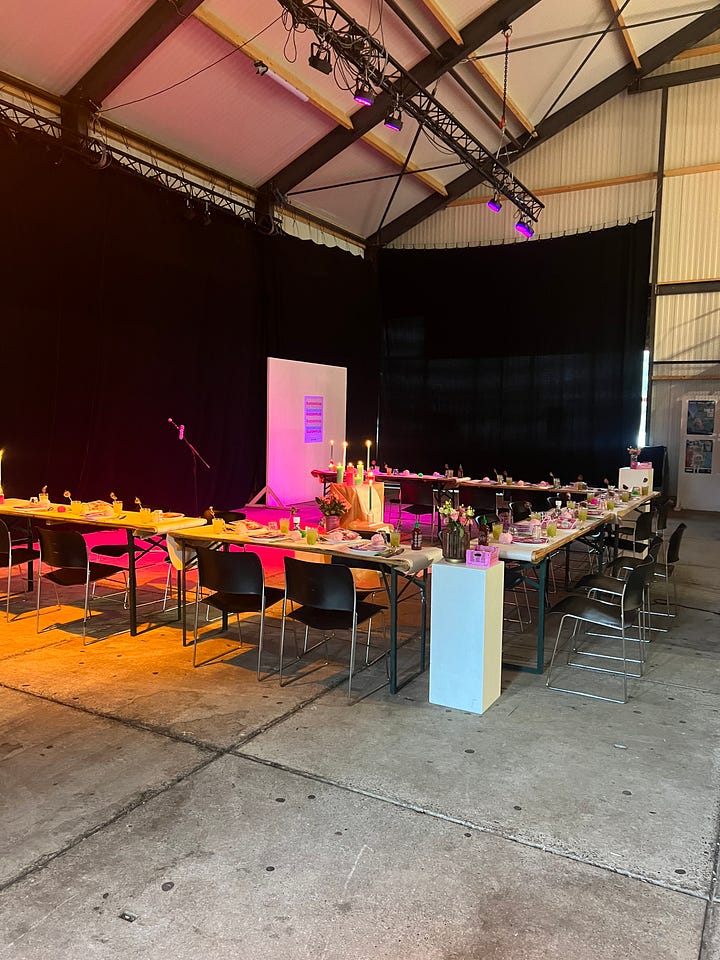
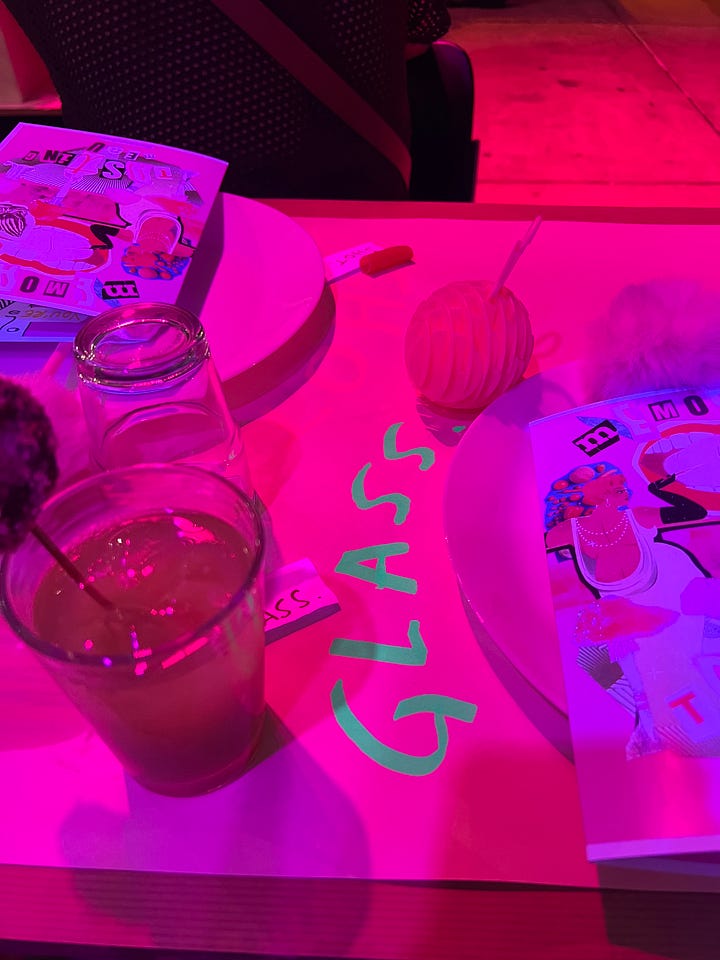
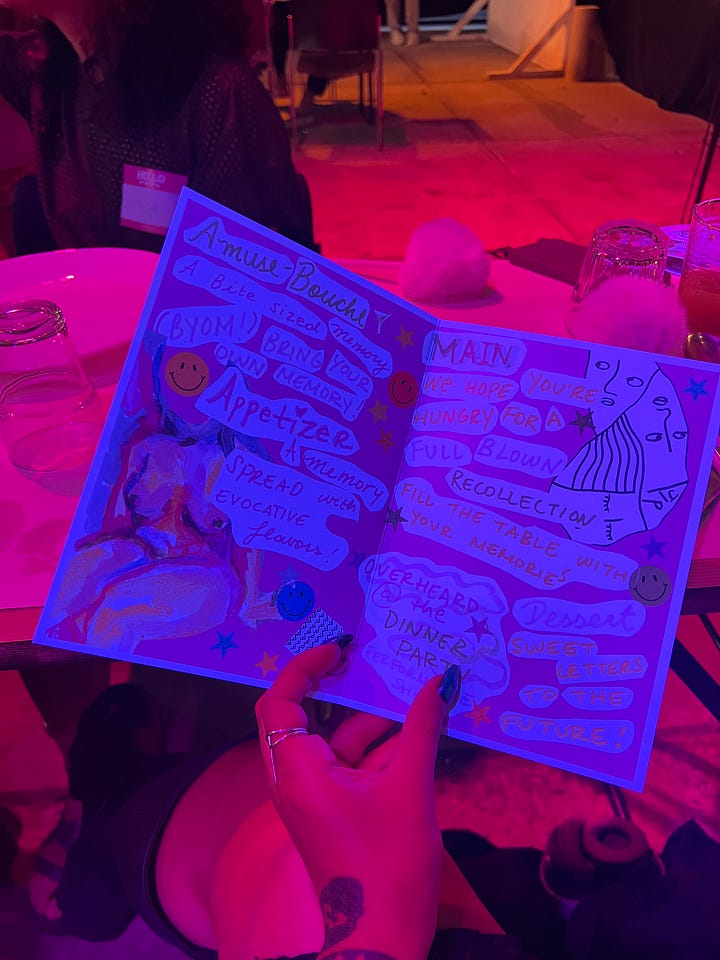

Poetry dinner party
This Monday, I spent three hours indulging in a secret four-course Poetry Dinner Party organized by Poetry Trapper Keeper and VEGAN BEAR CHEF, an immersive experience combining deliciously nourishing food with poetry and deep conversation. The event was part of Poetry Trapper Keeper’s three-day takeover at Treehouse for Pride Month.
Each dinner course was paired with a collaborative prompt under the theme of “creating memory in community”, and every seat came with a cue. My cue was “glass”, and at first the word didn’t trigger much in me, I was too busy scanning my surroundings and tuning into the room’s energy. But as we sipped on our amuse bouche we were invited by the hosts to think about some of our earliest memories related to the keyword. I closed my eyes and got a flashback of a traumatic memory from childhood, one that I had buried somewhere deep. But this was not the time and place, so I shifted my focus to the people around me.
My friend, and date for the night, had to reckon with the word “gun”. Lucky for her she had no direct memories related to the word. And after a couple of rounds of creative sparring, “gun” turned into “water gun”, and shortly after my own word morphed into “sea glass”, prompting softer memories than the original one. I quickly scribbled three sentences in my notebook, hoping to get back to them by the end of the night:
Glass explosion from childhood.
Collecting sea glass and pretending it’s precious stones.
Glass from Beirut’s Blast in 2020.
Something sweet, something sour, we share as we devour
What followed next was our first course; a beautifully arranged communal platter of dips with different colors and flavor palettes. In addition to sharing the food with our neighbors and creative partners of the night, we were encouraged to exchange memories related to the flavors we were experiencing. And as we munched on our crackers and chips, stories of spicy threesomes, relationships turning sour, and dark times started pouring in—the intimacy of sharing food multiplied by the unfolding vulnerability.
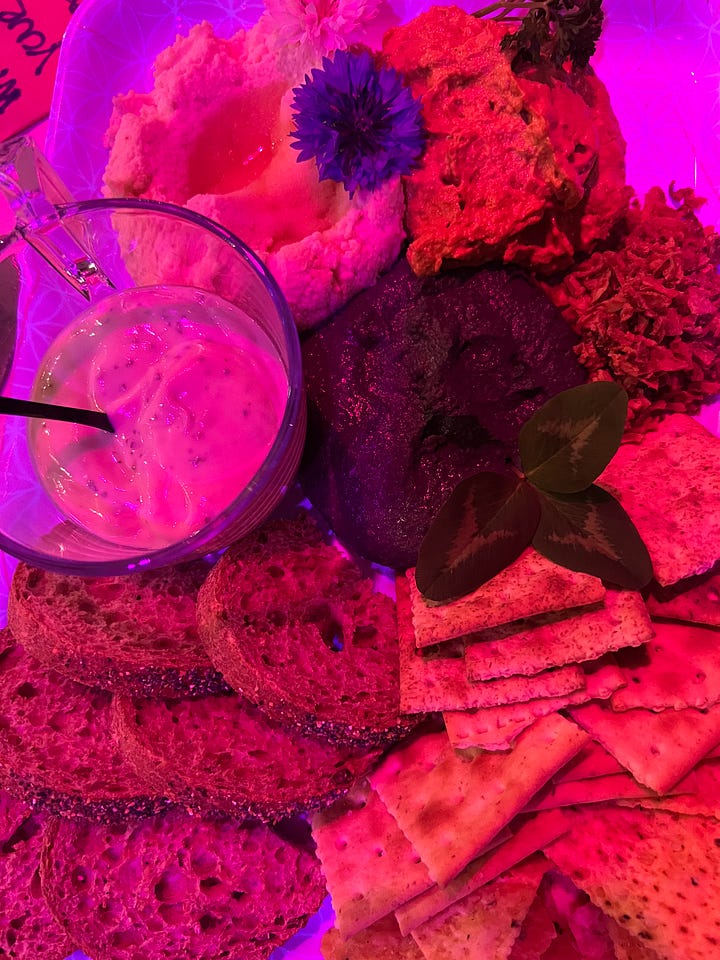
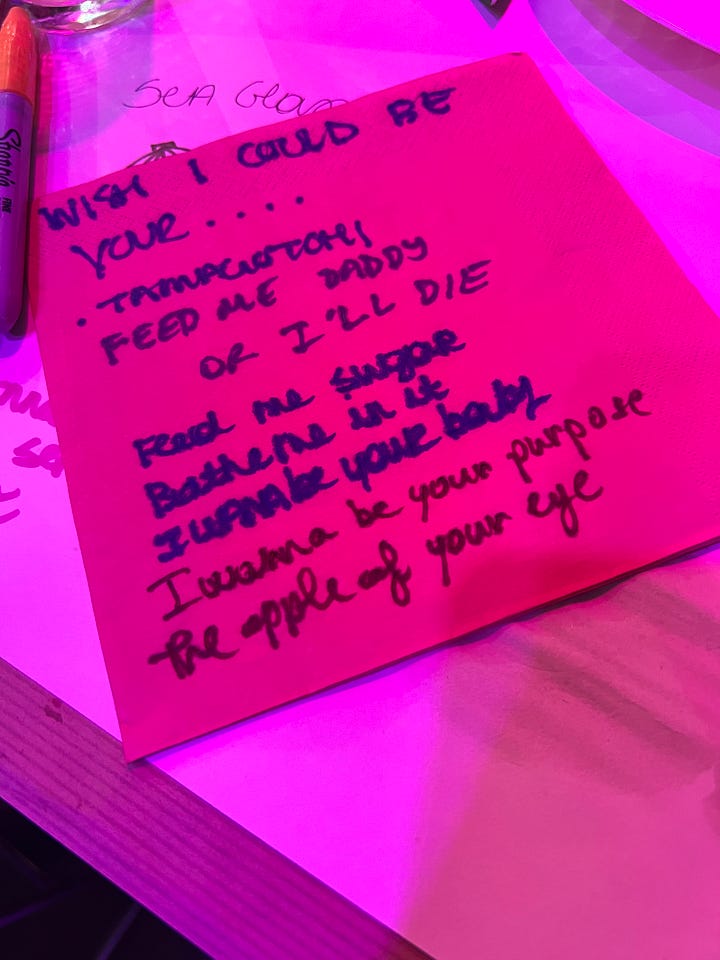
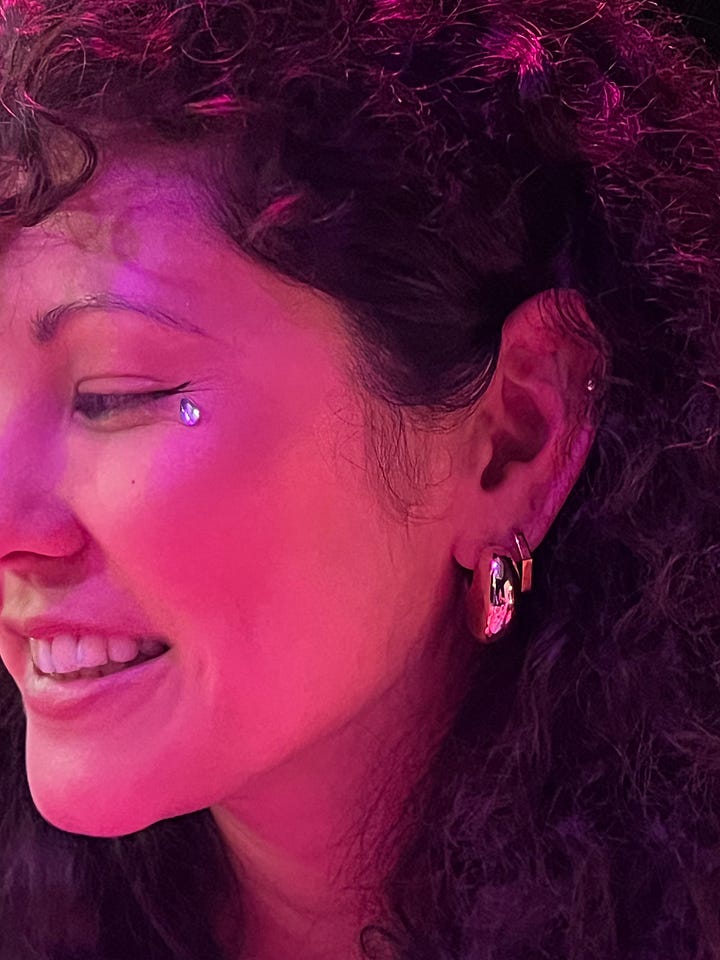
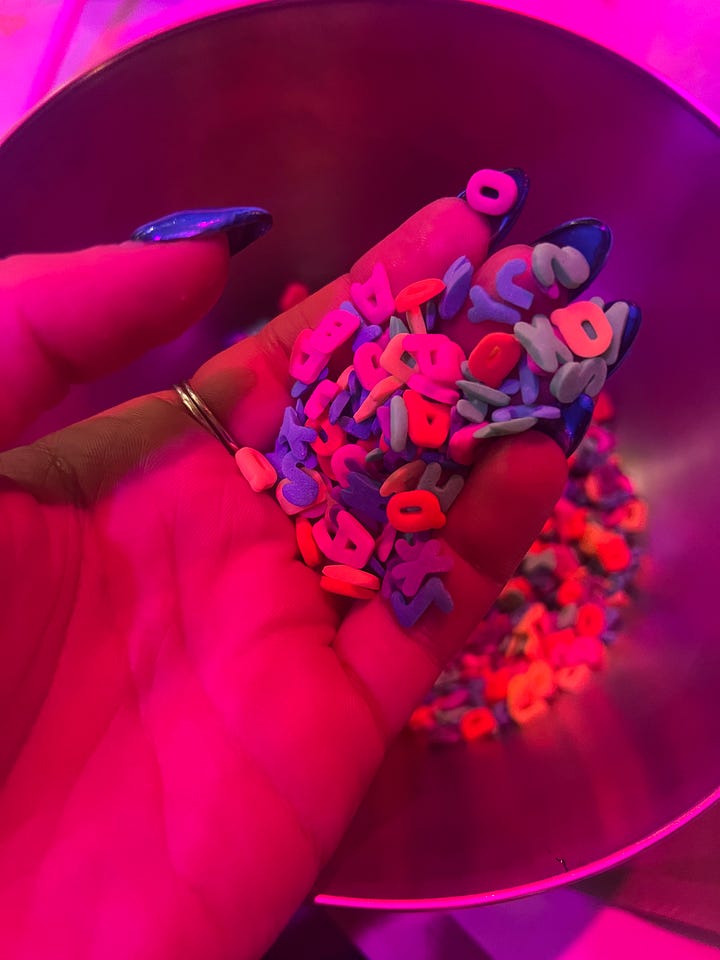
With every course and story shared, the strangers sitting across from me felt slightly closer. We were all heartbroken by something, we were all exploring the idea of home and identity, and trying to understand how we fit into the larger fabric of things. We all had secrets and were searching for engaged and understanding ears as shelter. No one threw stones at anyone, there was a shared consensus that we all lived in glass houses, which prompted compassion and care.
Meanwhile, napkins were exchanged from across the table, slowly filling with collaborative poems, as our tablecloths turned into one large communal notebook. But I couldn’t keep my mind off my own notebook where I had scribbled the three lines, so I bounced back and forth between my private space and our shared one.
When it was time for the open mic I wondered if I should read the poem I had weaved throughout the night; my small collection of glass-related memories. But I held back, as I often do when it comes to sharing work related to grief, trauma, and politics. I was the last one to go, and I ended up sharing a different piece called “Fingers”, which you can watch me perform in the video below.
Thou shalt not shit where you eat
Sharing memories and life experiences is a delicate matter. On one hand, it brings us closer to each other and creates an instant feeling of intimacy. The first thought that comes to mind when someone opens up to us is: “Wow, you must trust me”. On the other hand, there is also trauma dumping and trauma bonding, and sometimes I wonder where to draw the line. Especially when it comes to sharing intimate poetry.
Am I being overly protective, co-dependent, and self-rejecting when I refuse to bring the full spectrum of my lived experience to the space I’m in? Or is consent and reading the room the measure of a poet who cares about their community more than moving their literary and performance career forward?
Or maybe the truth lies somewhere in the middle. Maybe there’s a part of me that still shies away from presenting my lived experience. While sharing my lived experience can also be perceived as trauma dumping by some.
If you’re a poet or a writer, I would love to hear about your own experience and thoughts in the comments. As writers and creators, how do we practice community care while staying true to ourselves and what is being channeled through us?
A poem about growing up in a glasshouse
But enough theorizing, for now. Welcome to the trauma dumping section of my Substack. T.W. this poem mentions war and catastrophe trauma.
Glass; shards nested in my scalp. No one knows how the window shattered, or how it filled our living room with screams. I thought the world was ending, I thought the planes we heard flirting with our skies had finally made a move. Glass; blue, green, and yellow, softened by salt—harmless. Rocks with holes in them to gaze at the sun and make wishes. I asked to grow up faster. I was done being half-child half-woman; half-burden, half-shame. I still haven’t learned how to be careful with wishes. Glass; a city in ruin, I watch its pieces on my phone. I feel my hands bleeding while I collect store windows, building facades, and the lie of a home that is safe. One that isn’t always out to get you, that you don’t have to sweep under rugs, and store in the back of your throat. Glass; he asks if I know that place in Amsterdam that sold glasses made from Beirut's debris. They’re expensive, he adds, and I wonder how to price something with loss weaved into it —gashes fused together to hold space. Glass; I must be priceless.




